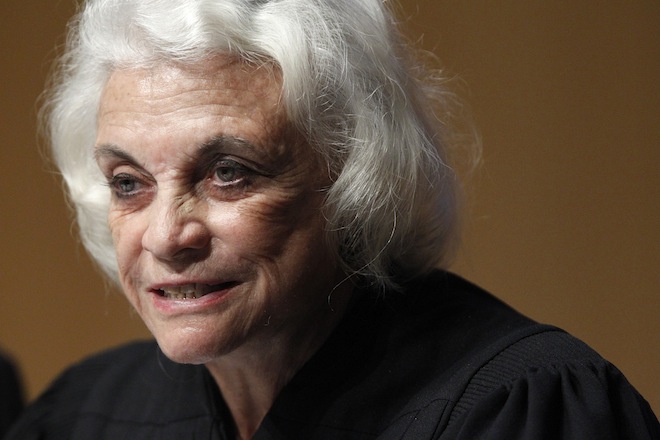Thirteen years after her pivotal swing vote in Bush v. Gore, retired Justice Sandra Day O’Connor is suggesting it was a mistake for the Supreme Court to take up the case, lamenting as many scholars have that it tarnished the Court’s reputation. But there’s another, indirect casualty of the fallout from the hyper-controversial 2000 case that effectively settled the presidential election for George W. Bush: O’Connor’s own legacy.
In a bit of historical irony, when O’Connor retired in 2006, the man she helped make president replaced her with Samuel Alito, a staunch conservative who proceeded to unravel several major rulings where O’Connor had held the swing vote and had shaped the law — most notably on abortion, campaign finance and racial diversity in education.
“Alito is significantly more conservative than she is,” said Lucas A. Powe, a Supreme Court historian at the University of Texas School of Law in Austin. “Now partial birth abortion can be outlawed. There’s no doubt that Citizens United goes against where she was [on campaign finance]. And [affirmative action] is going to get hammered.”
In 2000, O’Connor voted with the court’s four liberal-leaning justices in a 5-4 decision to invalidate state laws banning late-term abortion. In 2007, Alito voted with the four conservative-leaning justices to reverse that decision and validate bans on the procedure.
In 2003, O’Connor voted in another 5-4 decision to uphold campaign finance restrictions. In 2010, in Citizens United v. FEC, Alito helped reverse much of that decision by siding with the four conservative-leaning justices to wipe out key campaign finance limits.
In 2003, O’Connor enshrined affirmative action into law in a landmark 5-4 decision she wrote validating the use of race as a factor in the college admissions process. In 2007, with Alito hostile to affirmative action, the Court hinted at reversing that ruling, Grutter v. Bollinger, and is widely expected to deal a blow to it either in a pending case set for a decision this year or in an upcoming case the Court will hear next term.
“Justice O’Connor’s replacement with Justice Alito moved the center of the court to Justice Kennedy, which in a general sense made the court more conservative. And I think that manifests itself in lots of ongoing cases,” said Stephen Wermiel, a professor of constitutional law at American University Washington College of Law. “This term the future of affirmative action is at stake with Kennedy at the center, but there wouldn’t have been any question that O’Connor thinks affirmative action still has a shelf life.”
O’Connor — the first ever woman on the Supreme Court, appointed by Ronald Reagan in 1981 — has been accused of letting public opinion, rather than legal principle, guide her decisions. “It’s hard to talk about her legacy because what she was on the court was simply a walking Gallup poll,” said Powe. “As a doctrinal matter she doesn’t leave any legacy.”
Speaking to the Chicago Tribune editorial board last Friday, O’Connor said the Supreme Court “took the case [Bush v. Gore] and decided it at a time when it was still a big election issue. Maybe the court should have said, ‘We’re not going to take it, goodbye.'” She lamented that “probably the Supreme Court added to the problem” when all was said and done.
“It’s not unprecedented for justices to express regret [on decisions they made during their tenure] but it’s certainly not common,” said Wermiel.
Powe said O’Connor’s vote in Bush v. Gore appears to be weighing on her in several different ways. “It’s fairly well known that she disapproved of the Bush administration,” Powe said, “and since her vote was essential — or might’ve been essential — to making the Bush administration, she looks and says ‘I did that?!’ Beyond that, at the end of their careers or in retirement, justices tend to figure out where they screwed up. … Now we see that in retirement, O’Connor is still pining about Bush v. Gore.”










